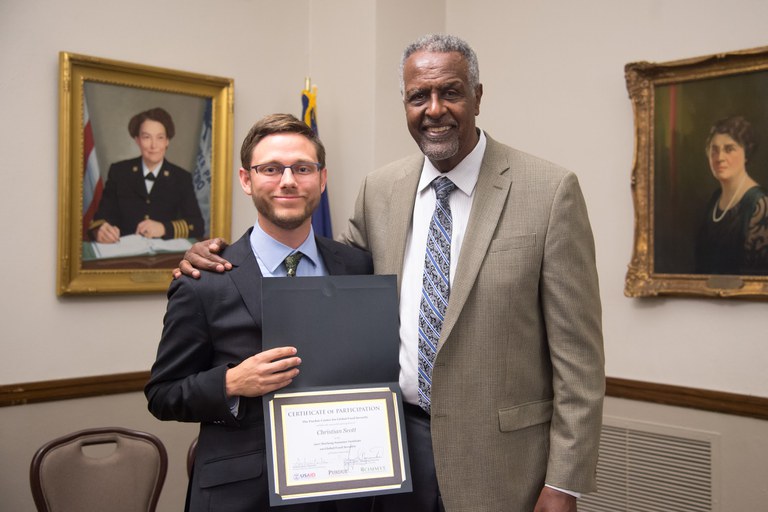Posted: September 6, 2017
"Who here knows about participatory research methods?" I yelled from the back of the room. And the response was silence as every single person in the audience turned around and looked at me. For about five seconds I felt like I had just made a horrible fool of myself. So, then I decided to ask again, "Who here knows something about participatory research methods?" And hands shot up in the audience. As I marched down the stairs to the front of the room describing the participatory rural appraisal method that my group had carefully applied to our project, I noticed that everyone was smiling. In that moment, with all those smiling faces looking down on me, I felt the collective good will of my peers to pursue solutions to global food security issues.
This June I was lucky enough to be afforded the opportunity to study at the Borlaug Summer Institute on Global Food Security. There I attended world class lectures and was able to interact with thirty-nine other graduate students form all across the world that are studying at American Universities. Frequently in graduate school we become victims to imposter syndrome and staying within our disciplinary bubbles. However, in this setting, I was in a room filled with many of the brightest minds, compassionate scholars, and brilliant thinkers, we were able to talk about our academic journeys. What I learned is that they are having a lot of the same challenges and successes in graduate school that I have. It helps to be in a safe setting in which to talk about these feelings and issues.
For two weeks we ate, slept, and drank global food security issues. Every day I was challenged to became a better scholar and critical thinker. I have pursued issues relating to global hunger and food insecurity in all of my professional and academic endeavours since high school and those two weeks were a life affirming experience for me. At the same time, the experience was so vastly comprehensive, that I had a case of: "the more you know, the less you know" following the institute. The depth and breadth of knowledge that my peers at the institute demonstrated was astonishing. It is hard to reflect upon all of the inspirational stories and intellectual skill that the other participants displayed because, quite simply, it leaves me at a loss for words. Superlatives, or at least the ones I can conjure up, fail to portray just how amazing the institute was.
After returning from the institute, I was able to immediately use the skills I had gained in the field. My fieldwork in Kyrgyzstan was a smashing success and I was able to carry with me the lessons from the institute through some difficult and profound moments in the field. Working in an interdisciplinary group at the institute was difficult but I feel that that difficulty is what also made the experience so rewarding. I am interested in human interactions as they relate to food security. I always have thought of my research as examining human social interactions that relate to food access, availability, utilization, and sustainability. But there was a major part of human interactions that I was not focusing on, the human interactions that take place among individuals that conduct research and advocate for food security issues. Dr. Otto Doering shared with us, in a lecture, the value of the cultural anthropologist but more than that, he shared with us the value of interdisciplinary work in tackling wicked problems, like food insecurity, on a global scale.
Purdue has a beautiful campus and the Center for Global Food Security and the entire Purdue community put on a show in graciously hosting us. Beyond that, the Purdue institute attendees hosted generous gatherings where we were able to let our hair down learn about the unique stories from all around the world that we have experienced. Discussion of ethics and asking difficult questions prompted intriguing cross dialogues that spanned disciplinary and epistemological divides. It was not until the final day of the institute that I learned that Dr. Gebisa Ejeta, (World Food Prize Laurette, Director of the Center for Global Food Security, and an all-around kind and inspiring figure) was a friend of late my grandfather. They were conference buddies at plant breeding academic conferences. During Dr.Ejeta's final address, I heard my grandfather speaking through him… to strive for solutions to global food insecurity... and to use this gift of education we have been given to pursue societal good.
Much of graduate school is developing your scholarly persona. After leaving the institute feeling so enthused I feel that I made significant strides to be the kind of scholar that I would like to someday become. We needed only to look at the way in which Dr. Ejeta conducts himself to provide us with an immediate model of what a brilliant, humble, and impactful scholar can be. With these inspirations and the memories of my late grandfather, I will continue to work, study, and strive for solutions to global food insecurity for the rest of my life. I will carry this interdisciplinary appreciation to food security issues with me for the rest of my working days. In fact, we all left West Lafayette having engaged in participatory food security studies and will carry the flag for a better world without hunger for the rest of our days.
Christian Kelly Scott is a second-year dual doctorate PhD student studying Rural Sociology and International Agriculture & Development at Pennsylvania State University in the Department of Agricultural Economics, Sociology, and Education.
INTAD
Address
Melanie Miller Foster106 Agricultural Administration Building
University Park, PA 16802
- Email mjm727@psu.edu
- Office 814-863-0249
- Fax 814-865-3055
INTAD
Address
Melanie Miller Foster106 Agricultural Administration Building
University Park, PA 16802
- Email mjm727@psu.edu
- Office 814-863-0249
- Fax 814-865-3055


